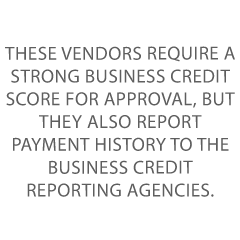
Check Out These Tier 4 Business Credit Vendors That Can Help Strengthen Your Business Credit Score
At Credit Suite, we talk about building business credit by working through the vendor credit tiers. These tiers are how we classify vendors based on their ease of credit approval. Tier 1 vendors are likely to extend net terms based on meeting some basic Fundability guidelines. Meanwhile, Tier 4 vendors are likely to require a strong PAYDEX, among other things.
Are Tier 4 Business Credit Vendors Really Necessary?
First, not all vendors fall into tiers. Tiered vendors report payments to at least one business credit reporting agency. Vendors that do not report do not fall into a tier. However, don’t discount them. They can still be very useful to your business.
Vendor credit as a whole is important to building a strong business credit portfolio. Still, we get questions from potential clients wondering if it is necessary to work the tiers in order. Furthermore, is it necessary to have accounts from all the tiers? Can you just get accounts in Tiers 1 and 2 and then stop?
It seems to some that if you have enough accounts in Tier 1 and Tier 2 to qualify for Tier 3 vendors, that should be enough. Enough for what though? Yes, you may have a decent business credit score at this point, but these accounts are not going to be enough to properly fund your business. After all, that is the point of a strong business credit score. The goal is to qualify for as much funding as possible to run and grow your business.
Do You Have to Work Through the Business Credit Tiers in Order?
There are those out there that hold the idea that there is no need to work through the tiers. Some business owners will tell you they were able to skip straight to Tier 4 without applying for credit from vendors in tiers 1-3 first. Honestly, it’s possible.
If you have a large amount of income or want to use a personal guarantee, and if you have a long time in business, you MAY be able to get credit from Tier 4 vendors and even credit cards, without working through the other tiers.
So What’s the Point?
The whole point of the Credit Suite vendor tiers is to help our customers mix-up the “secret sauce” of business credit. Building business credit this way allows you to limit using a personal guarantee and protect your consumer credit.
It also allows for you to build your business credit portfolio and your business credit score at the same time. Even better, this way allows your business to scale and grow faster, because you can use the funding for things you need while you are building business credit. Vendor accounts can help with a number of expenses including marketing, inventory, supplies, and more.
You do not have to incur large amounts of personal loans from the beginning. There is no need to wait until you reach a certain point to start utilizing credit in the name of your business. Rather, you can work on building business credit and use business credit from the beginning. As you do so responsibly, you will begin to qualify for vendors that offer more money and better terms, hence the other tiers.
By continuing on with Tier 4 business credit vendors, you will have more access to what you need to run your business, expand your business credit portfolio, and continue building your business credit.
Tier 4 Business Credit Vendors
These vendors require a strong business credit score for approval, but they also report payment history to the business credit reporting agencies. Here are a few examples.
Ally Car Financing Through Credit Suite
Ally provides personal financing, but they will also report to business credit bureaus. If your business qualifies for financing without the owner’s guarantee, you can get financing in the business name only. They will report to Experian and Equifax.
Ally offers a Commercial Line of Credit. To qualify, you need:
- To be an entity in good standing with the Secretary of State
- An EIN
- A business address- matching everywhere
- A D-U-N-S number
- All business licenses (if applicable)
- A business bank account
- Bank reference
- Fleet financing references
If a personal guarantee is used Ally will not report to the personal credit bureaus unless the account defaults.
You can also get a lease or a loan through Ally.
To qualify, you need:
- To be an entity in good standing with the Secretary of State
- An EIN
- A business address- matching everywhere
- A D-U-N-S number
- All business licenses (if applicable)
- A business bank account
There is no minimum time in business requirement.
You can only apply in person, and the dealer will let you know if you are approved or if a Personal Guarantee (PG) is necessary.
Brex
Brex is a business money management system that integrates with your accounting software. It allows you to track expenses and, depending on the level of service you choose, can also help with paying bills and controlling spending.
The easiest way to use Brex for both managing finances and building business credit is to open a Brex Cash account. Brex is not a bank, but rather a banking alternative. They do have a partnership with the FDIC, so your funds are secure,
They have a couple of options, but the one that falls into Tier 4 is similar to a traditional business credit card when it comes to limits. Instead of checking your personal credit score, they base approval and credit limits on business financial information. This may include available cash, spending patterns, and more.
If you qualify for this card, your entire balance will be paid monthly. This makes it more like net financing, as you cannot carry a balance. Brex requires an average bank balance of $1M to qualify for net 30 terms.
Ford Commercial Vehicle Financing Through Credit Suite
Ford offers several commercial vehicle financing options. These include loans, lines, and leases to actual business entities. You can get a loan or a lease.
They may ask for a Personal Guarantee (PG) if you are not approved on the merit of your application. Ford will report to D&B, Experian, and Equifax. To qualify, you need:
- To be an entity in good standing with Secretary of State
- An EIN
- A business address- matching everywhere
- A D-U-N-S number
- All needed business license(s)
- A business bank account
- Strong business credit history
- A good Experian business credit score
Frost Bank Business Rewards Credit Card
Frost bank requires $5M annual revenue to avoid PG. Also, you have to apply in person. If you apply online a PG may be required regardless. They only offer financing to current customers, and there is no minimum time in business requirement.
Don’t Stop Building Business Credit
Business credit is something you continue to build upon and improve, not a path to a final destination. This is much like a business itself, and the two go hand in hand of course. You want your business to continue to grow and thrive indefinitely, and tier 4 business credit vendors can help with that.
The post Check Out These Tier 4 Business Credit Vendors That Can Help Strengthen Your Business Credit Score appeared first on Credit Suite.




